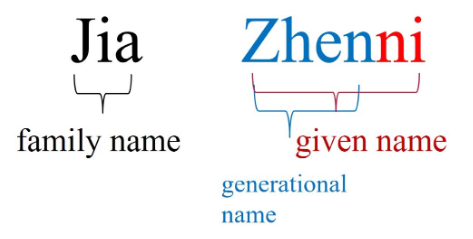By the staff of the Center for Chinese Language Instruction

Everybody identifies with their name. Making the effort to pronounce a name correctly in class tells a student that you recognize them as a person they are and a welcome part of the class. Names are embedded in their cultures. Chinese names carry culturally rich meanings and a personal and shared history that reflect philosophical traditions and social customs. A person’s name tells the story of their parents’ ideals and hopes for them, aspirations that the name’s bearer often embraces throughout their life. So you can see, Chinese names are more than just labels.
Chinese names can be especially hard for non-Mandarin speakers. When talking about Chinese names, it is important to keep in mind that the basic unit in written Chinese consists of 3 parts: the character, the pronunciation and the meaning. All 3 parts come into play when naming a child. Below we will discuss Chinese naming culture in detail.
Cultural significance of a Chinese name
Chinese naming culture has deep historical roots. Traditional Chinese naming practices date back thousands of years and have been influenced by various philosophies and belief systems, most notably Confucianism, which emphasized the importance of family and ancestral heritage. Chinese names are typically structured with three elements: the family name (surname), the given name, and, in some cases, a generational name. The family name comes first, symbolizing the importance of family and heritage. This structure is in contrast to many Western naming conventions where the given name comes first. For example, a common name in America is Joe Smith. In China, they would be known as Smith John.

Family name: The family or surname appears first in Chinese culture and is of paramount importance. It represents not just an individual but an entire lineage. Surnames are shared by extended family members, reinforcing the sense of belonging and connection. There is a sense of pride and responsibility associated with carrying on the family name.
Given name: Given names appear after the family name and are carefully chosen. Families want to give children names that are phonetically and semantically meaningful. Names may be selected to reflect desirable qualities, aspirations, or the circumstances surrounding a child’s birth. Names chosen for boys often symbolize strength and power. Girls’ names often represent beauty and kindness. The process of naming is also believed to influence a person’s destiny.
Generational name: Generational names are built into a given name. They are used in maintaining continuity within the family and are passed down through generations, creating a sense of unity and tradition. It’s common for siblings and cousins related patrilineally from the same generation to share a generational name element. For example, Jia Zhenni and Jia Zhenhai are siblings. They have cousins named Jia Zhenhua, Jia Zhendong, Jia Zhenguo, and Jia Zhenxing. The ‘zhen’ is their generational name. When all of their names are spoken, you can hear the “zhen”, but they all use a different character and may have different meanings. In some families, the generational character is the same for all members of the generation. Another option is for all the males to share a character and all the females to share one.
Not all families use a generational name. Some generational names have been lost as time goes by. Some smaller families can’t trace their lineage back and do not have a family history of using them so choose to not use them going forward.
Choosing characters with good meaning: Chinese names are composed of characters, known as Hanzi. Each character can carry cultural, historical, and sometimes even spiritual significance. The choice of characters can convey deeper meanings and invoke connections to Chinese heritage. Chinese culture also has a rich folklore related to names. So, while some names are considered lucky, others are believed to bring bad fortune. These folk beliefs influence naming choices, especially for newborns. The character for ‘ugly’ is chou (丑) and another chou character (臭) means ‘bad smell’ making it unlikely that you would ever use any character pronounced chou in a name, even if it has a different meaning, because it is too close to ‘ugly’ and ‘stench’ in pronunciation.
Correctly pronouncing names is important. There are 4 tones in standard Chinese. Correct tones are crucial for conveying the intended meaning. If the pronunciation of a tone is wrong, a different word from the one intended is said. A common example of how the 4 tones distinguish words from one another uses syllables that share the consonant-vowel sequence ma but differ in tone. Mā in the first tone means ‘mom’. Má in the second tone means ‘trouble’. Mǎ in the third tone means ‘horse’. Mà in the fourth tone means ‘to scold’.
A Chinese name is always a Chinese word that has a tone as part of its correct pronunciation. Let’s look at an example of mispronouncing a tone in a name. In the name Wang Wèn (王问), the second syllable is in the fourth tone and has a meaning of a smart and inquisitive individual, this being a very good trait in Chinese culture. If pronounced Wang Wén (王蚊) with the second syllable in the second tone, it could mean mosquito which has bad associations.
One could also mispronounce a name and change its meaning. An example of this is the phrase Zhang Laoshi (张老师) which means Teacher Zhang. If the name Zhang is mispronounced as zang (脏), the resulting phrase Zang Laoshi could mean “dirty teacher,” something one would not want to call somebody, especially their teacher or professor.
What Can A Faculty Member Do To Learn Students’ Names?
Because of the meanings and histories names can hold, we should make every effort to learn how to pronounce them correctly. Chinese names can be especially hard for non-Mandarin speakers. Below are a few steps and suggestions faculty members can take to learn students’ names:
-
- Review your class roster before you get to the first class and make a note of any names for which you are unsure of the pronunciation.
-
- At the first class, when going over the roster for the first time, you can say, “It’s important to me that I learn how to pronounce everyone’s names correctly, so I will ask again if I need more help. Thanks for your patience as I try to learn your names.”
-
- Ask students to tell you the correct way to pronounce their names and make notes on your roster of the pronunciation for future reference. Repeat the name after the student pronounces it. Ask “Is that right?” to determine if you need to make adjustments to your pronunciation. But try not to call a student out by spending too much time on pronouncing their name in front of the entire class. Students might find this embarrassing. If need be, catch them after class or before the next class. Some students might also insist you call them by their American name and that is okay too. Your initial effort will not go unnoticed.
-
- Check out this Chinese pinyin chart with audio included from Chinese.Yabla.com. There are a number of common Chinese names you will be able to find on the chart. This will not account for the correct tone a Chinese name should be pronounced in without hearing it from the student first, but it will help with certain sounds and show you the difference between the pronunciation of the 4 tones.
-
- For a non-classroom setting, say a business meeting, interview or social event, it is totally fine to ask someone again the correct way to pronounce and say their name. Even repeat it a few times until you get it right.
Pronouncing a person’s name correctly is a sign of respect and cultural understanding, so the effort you put into learning students’ names will help you build a more positive rapport with students and signal that you care about them as people.
For more help with Chinese names and things related to Chinese culture, please contact the Center for Chinese Language Instruction at Temple University, ccli@temple.edu.
The Center for Chinese Language Instruction supports Chinese language instruction within the Chinese major and introduces Chinese popular culture through social and cultural events in the Temple community.